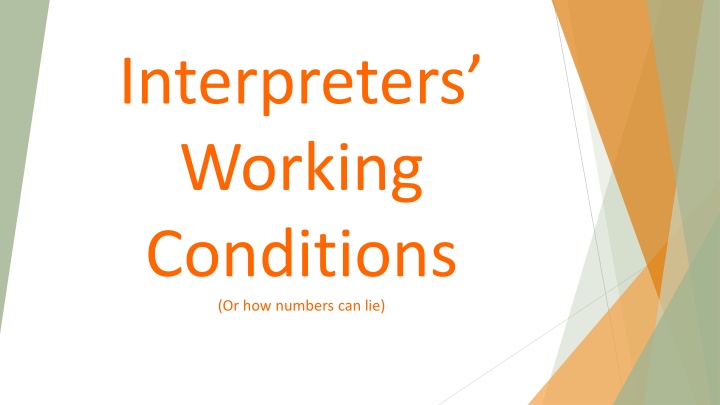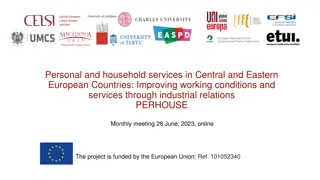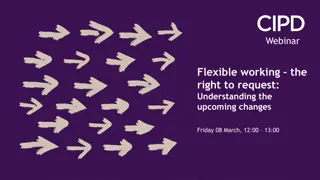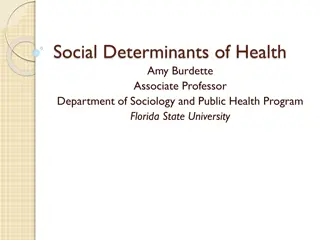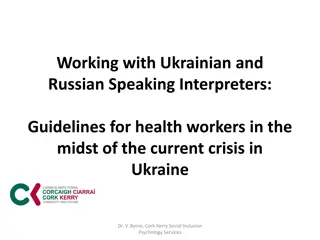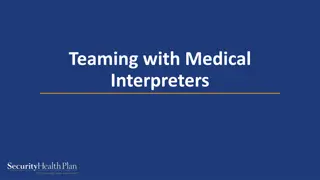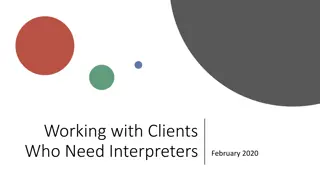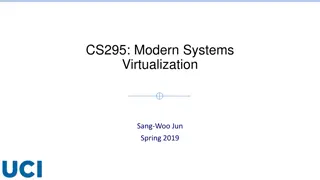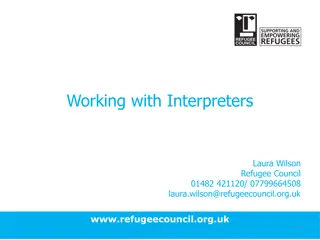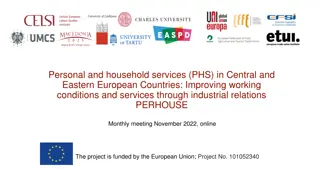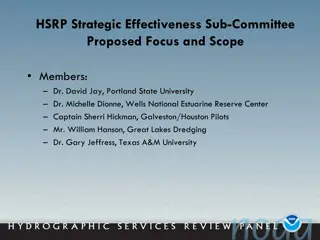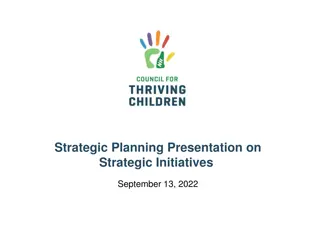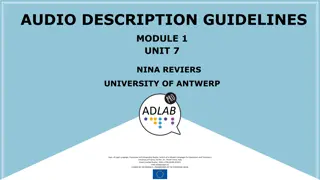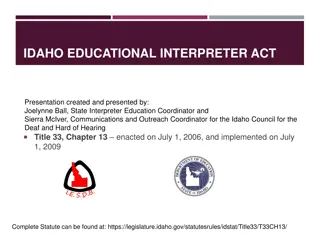Improving Interpreters' Working Conditions Through Strategic Changes
Recognizing discrepancies in workload distribution among interpreters, the need for a more efficient system was acknowledged. By abolishing interpretation slots and implementing new working conditions, productivity gains were evident, primarily from other efficiency measures. The new system aimed to reduce extreme cases of workload disparity and increase overall fairness. However, limitations in productivity impact were noted due to certain factors not accounted for in existing statistics. Despite progress in workload balance, further adjustments are necessary to optimize productivity fully.
Download Presentation

Please find below an Image/Link to download the presentation.
The content on the website is provided AS IS for your information and personal use only. It may not be sold, licensed, or shared on other websites without obtaining consent from the author.If you encounter any issues during the download, it is possible that the publisher has removed the file from their server.
You are allowed to download the files provided on this website for personal or commercial use, subject to the condition that they are used lawfully. All files are the property of their respective owners.
The content on the website is provided AS IS for your information and personal use only. It may not be sold, licensed, or shared on other websites without obtaining consent from the author.
E N D
Presentation Transcript
Interpreters Working Conditions (Or how numbers can lie)
WHAT WAS THE PROBLEM? Average time in the interpreting booth of 11:54 hrs per week. Unfair distribution of workload with some interpreters working on average only 6 hrs in the interpreting booth per week while others did 20 hrs. Outdated and unflexible system of interpretation slots impeding proper service for Members and efficiency. Interpreters have always recognized the need for change: they agreed from the very start to the abolition of interpretation slots to make the system more flexible. Differences in workload are due to different language combinations: it has nothing to do with working conditions. Not all interpreters are interchangeable. Management has recognised its responsibility to minimise imbalances. Extreme cases in the past (6hrs in the booth per week) because all out-of-booth tasks were not taken into account.
Effects of measures taken
MORE PRODUCTIVE Entry into force of new Working conditions Most productivity gains came from other measures such as more spread-out meeting patterns and more efficient programming Period still covered by 2006 Working conditions
MORE PRODUCTIVE New imposed Working Conditions have brought about savings, but there are limits to their impact on productivity due to the EP calendar. Productivity is not measured by the number of booth hours, but by the number of meetings serviced. If DG LINC covers all meeting requests, the system is 100% productive. The only other parameter should be quality. EP Management s statistics cover only booth hours, all out-of-booth activities are not taken into account. Annual leave during weeks of parliamentary activities and short-term sick leave initially not taken into account Statistics still do not: factor in booth hours worked at the Commission and Council; exclude rest time after late assignments; exclude rest time after intercontinental missions; factor in last-minute cancellation of meetings.
FAIRER WORKLOAD Number of interpreters with only 6 - 10 booth hours per week reduced by 2/3 The year of greatest gain was 2016 to 2017, where numbers decreased by 46% from 5,8% to 3,1%. Entry into force of new Working conditions This was only marginally touched by the new WoCos. It is impossible to isolate the gains deriving from WoCo changes from this data. These gains are likely caused primarily by efficiency gains predating and not related to changes in working conditions Period still covered by 2006 Working conditions Period still covered by 2006 Working conditions
FAIRER WORKLOAD Number of interpreters with very high work load reduced to zero Entry into force of new Working conditions Gains were made under old WoCos Gains after imposition of new Wocos well within the margin of natural fluctuations Period still covered by 2006 Working conditions
FAIRER WORKLOAD Number of interpreters with only 11 - 12 booth hours per week reduced by 40 % Entry into force of new Working conditions According to Management's own data, numbers of staff decreased and of meetings increased It is not possible to ascertain from this data that the decrease of low workloads was due to new WoCos as opposed to increased workload Period still covered by 2006 Working conditions
FAIRER WORKLOAD Number of interpreters with high workload only slightly increased The slight increase actually amounts to 46% if we use the same calculation method Management used for previous slides Entry into force of new Working conditions Most of the increase pre-dates new WoCos, other factors rather than WoCos are affecting productivity and workload distribution 13% of total 12,3% of total 14,7% of total 9,6% of total That the workload increased and decreased under the old WoCos shows that linking this trend to WoCos is meaningless Period still covered by 2006 Working conditions
FAIRER WORKLOAD More and more interpreters with fair workload of 13 -15 booth hours Entry into force of new Working conditions Trend already existing under old WoCos. Part of the general increase in workload Connection between this trend and new WoCos is not established Change +13 Change -1 Change +18 Period still covered by 2006 Working conditions
MORE FAIRNESS IN DISTRIBUTION OF WORKLOAD Entry into force of new Working conditions Period still covered by 2006 Working conditions As proven by Management's own numbers, change happened mainly before new WoCos. The connection between productivity gains or fairness and new WoCos remains to be established. The changes can be best explained by better programming.
SAVINGS WITH MORE MEETINGS SERVED More efficient use of staff interpreters allows for savings of: 2 180 contract days for freelance interpreters of EUR 1 050 = EUR 2 289 000 over one year in favour of Parliament s budget while serving more than 100 additional meetings. Most savings obtained using old WoCos and flexibility interpreters agreed to. Even after the imposition of new WoCos, faced with impending industrial action, DG LINC was instructed to apply a "light and sensible version" of them, which aligned them to a great extent with the interpreters' proposals. The new WoCos were therefore not necessary for these savings to be made.
BETTER SOCIAL PROTECTION? (I) 2006 2017 Max. 12 hrs? Working day span from 8:30 to midnight. This is only indicative, the maximum span could be longer. Interpreting slot system: day divided into 3 slots: morning, Interpreters could only work in the booth 2 out of 3 slots. Usable break to recover and prepare the meetings. afternoon, evening. Interpreters are available throughout the whole period, no guarantee of a usable break. Max. 6 late meetings per month and Max. 4 early meetings per month No limit for late meetings after 18:45 in BXL or 21 in SXB. Need of agreement between Management and interpreters on assignments outside standard working hours. The interpreting slot system offered sufficient safeguards. Zero-cost concession by Management: number of late meetings per month is way lower, even lower than in interpreters proposals.
BETTER SOCIAL PROTECTION? (II) 2006 2017 No limit for early meetings (before 8:30) Max. 4 early meetings per month Early meetings hardly ever occurred, no limit necessary. Zero-cost concession by Management. The number of early meetings per month is negligible. No evening work in Strasbourg for parents accompanied by children No protection for parents Consolidated practice in place as codified in the 2017 text. Codification of a consolidated practice. No real change.
TARGETS ACHIEVED (I) Productivity increased by two hours (from 11:54 to 13:50) Mostly before the new WoCos. Under the new WoCos, an important contribution was that interpreters accepted increasing the daily maximum to 7.5 hrs without any conditions. Numbers of interpreters with very low workload reduced by 2/3 The reduction occurring after new WoCos was from 3,1% to 2,5% of total staff, due to better programming, no direct link with WoCos. Numbers of interpreters with low workload reduced by 40% The reduction occurring after the new WoCos was of 9% of total staff (27%-18%), due to better programming, no direct link with WoCOs. Increase of interpreters with fair workload The increase was a strong trend already before new WoCos. No direct link with WoCos.
TARGETS ACHIEVED (II) No more interpreters with very high workload. Development almost entirely appeared under 2006 WoCos, no direct link to new WoCos. EUR 2 289 000 savings with more meetings served. Not clear how much this is due to new WoCos in view of productivity increase under previous WoCos. More flexibility to adjust to new meeting patterns thanks to efforts made by interpreters in the reform process. Better social protection for interpreters. On the contrary, social protection and work-life balance have worsened due to more flexibility. That explains almost unanimity amongst interpreters against new WoCos. Too wide a margin to increase evening work (theoretically possible almost every Monday, Tuesday and Wednesday in Brussels during Committee and Group weeks).
NO SOCIAL DIALOGUE Nr of meetings Outcome Partners Time Interpreters Delegation, DG INTE 2013-2015 39 meetings Rejection by interpreters True, but caused by undue pressure and lack of communication with rank and file interpreters. Rejection by interpreters False. A minimalist proposal was made, not negotiable, with the threat of imposition of conditions if not accepted. Interpreters made counterproposals and asked for further negotiations. Negotitations unilaterallystopped by Management 2016 13 meetings Interpreters Delegation, DG INTE Rejection by interpreters False. Negotiations unilaterally stopped by Management. Unilateral imposition of new WoCos in July 2017 2017 22 meetings Cabinet SG (S. Altenberg), President of Interpreters Delegation (R. Aquino) 11/2017 to date 14 meetings, ongoing Process ongoing, text sent for formal consultation True but: Text of formal consultation worse than WoCos imposed in 2017 Without interpreters present No developments on text after 7 months No guarantee of abiding by an agreed text at the end Access to key figures on real needs constantly denied. Secretary-General, Staff Committee
Amendments accepted by the Administration in social dialogue... or rather: points where Administration were willing to reduce their initial demands Second Phase (October to December 2017) First phase (May to July 2017) Third Phase (January 2018 to date 2018) 8h days limited to 6 per month 2 hrs more than at the UN. virtually possible every Tuesday and Wednesday in most months 8h days limited to 6 per month Could be reduced to 5 per month under conditions Restriction of early assignments to 4 per month and late assignments to 6 per month plus endeavour to respect a max. of 5 late assignments per month Restriction of early assignments to 4 per month and late assignments to 6 per month These two rules together make it possible for interpreters to have a total of 10 days of atypical schedules in a month, amounting to close to 50% of all booth days Restriction of early assignments to 4 per month and late assignments to 6 per month 12h daily span of work day for interpreting assignments If 12h reached or exceeded an uninterrupted break of 5h (in Brussels) will be given. 12h daily span of work day for interpreting assignments NOT binding Minimum rest time over night is 11h. Longer rest time after late assignments. Minimum rest time over night is 11h. Longer rest time after late assignments Based on scheduled times, leading to infringements of Directive 2003/88/EC when meetings overrun Minimum rest time of 12h in all cases Longer rest times after late assignments abolished. Based on scheduled times, leading to infringements of Directive 2003/88/EC when meetings overrun Extension of lunch break for the 6h day and specified slot 45-minute lunch breaks in 6-hour days is a huge concession from interpreters, not Management. The standard lunch break was 90 minutes under the 2006 WoCos . Whenever possible break of 45 minutes for Sxb group meetings of max 6h For Sxb group meetings, abolition of reinforcement with additional interpreter Rest period of 4h for every day on mission with more than 12 hours on duty including for ACIs Reduction of interpreting hours equal to extra time on duty over 2 weeks after mission. ACIs excluded. Worse than second phase
Amendments accepted by the Administration in social dialogue...but no real concessions First phase (May to July 2017) Second Phase (October to December 2017) Third Phase (January 2018 to date 2018) Meeting and speech preparation in management commitments New rule on Strasbourg Mondays (6h max) or free Tuesday morning Meeting and preparation neither included in any output indicator nor taken into account when organizing individual programmes. Little more than vague recognition with no effect on working conditions More than 6h never happens. The real problem is the daily span (travel + late assignments) Revision: Consultation of Staff Committee preceeded by a preparatory dialogue Interpreters/DG LINC. Justified impediment to work outside working hours will be taken into account in addition to guaranteed evenings Follow-up Group created Major decrease in rights vs previous WoCos, where agreement with interpreters was necessary Not a concession: earlier an agreement between the interpreter and Management was necessary Would allow to find solutions to cases not provided for or not allowed in the WoCos. At least as much in the interest of Management as of interpreters Interpreters require guarantees that their WoCos cannot be forfeited at the stroke of a pen without any type of agreement Guaranteed evenings already existed, they are not a concession and are always dependent on the needs of the service No additional tasks after 7.5h in the booth No additional tasks on 6h booth day Not a real concession. 7.5h in the booth + meeting preparation are already a full day Compensation for a heavier type of assignment that did not exist: not a concession Adaptations to meetings considered comparable to plenary sessions Codification of current practices for some meetings. EESC and CoR plenaries no longer comparable to EP plenary, major concession from interpreters No evening assignments in Strasbourg for interpreters using the creche Codification of a consolidated practice : not a concession. There are no night time childcare facilites in SXB. Agreement of interpreter for frequent missions Already the case to a large extent: not a real concession Annex on non-interpreting tasks Belated recognition of out-of-booth work, but it does not affect programming. Not a safeguard towards quality, health or work-life balance
2006 Interpreter Working Conditions Division of the day into three interpreting slots, only two of which were available for assignments for individual interpreters Latest interpreters proposals Abolition of the slot system. Interpreters are available throughout the day within a maximum span of 11 hours. Such span can exceed 11 hours provided that a break of at least 5 hours is guaranteed Requirement to reinforce teams with an additional person per language for meetings longer than 3 hours Requirement to reinforce teams with an additional person per language for meetings longer than 4 hours, or abolition of reinforcement if assignments longer than 4 hours abolished Maximum of 7.5 hours in the booth per day Maximum of 7 hours in the booth per day as a general rule 90-minute break after a maximum of 4 hours in the booth Possibility of reducing the break to a minimum of 45 minutes circumstances Interpreting assignments are counted in sessions, reducing flexibility Sessions are abolished and interpreting assignments are counted in hours, increase in flexibility Plenary sittings of the European Economic and Social Committee and of the Committee of the Regions are fully equivalent to EP plenary sittings Plenary sittings of the European Economic and Social Committee and of the Committee of the Regions are treated like any other meeting A single plenary session not exceeding 3 hours may be combined with a maximum of 3.5 hours of other assignments on the same day. A single plenary session not exceeding 3 hours may be combined with a maximum of 4 hours of other assignments on the same day. Booths providing retour always staffed with 3 interpreters Booth providing retour staffed with 2 interpreters in meetings with up to 6 languages For assignments outside EP standard working hours, the Programming Unit needs to inform in advance and reach an agreementwith the interpreter For assignments outside EP standard working hours, the Programming Unit can assign the interpreter without prior information, although they shall endeavour to take into account an impediment of the interpreter N.B. All the efforts included in the table above are to be seen in a context where the work environment has become increasingly challenging for interpreters in terms of speed of delivery and technical nature of debates and where interpreters have increased their productivity through adding new languages.
FAIR COMPARED TO OTHER STAFF? Interpreters Other Staff No compensatory leave 1 - Compensatory leave for travelling on weekends Many compensatory leave or tacit agreements other categories have official No extra rest time 2 - Extra rest time for tiring missions Interpreting not possible if suffering from jetlag. Many other categories have formal or informal arrangements. Missions Guide applies to all staff No extra week 3 - De facto extra week of leave during summer Interpreters leave entitlements are the same as other staff No free Fridays 4 - Regular free Fridays for 50% of interpreters Interpreters are not free on Fridays. They carry out tasks outside the booth, prepare meetings, maintain their languages etc. as acknowledged by Management 5 - 13:50 hrs weekly average interpreting time 40-42 hrs work Interpreters 42hours/week. When not in the booth they carry out all other tasks are available for the service
WHERE INTERPRETERS ARE WORSE-OFF THAN OTHER STAFF Interpreters Other staff More control over their work schedule and pace No control over their work schedule and pace More predictability Instability: programme for the afternoon and evening only final after 13.30 of the same day, for the morning only after 19.00 on previous day No offices, work in confined space Offices Major leave restrictions More flexible leave arrangements
COMPARISON PARLIAMENT - COMMISSION European Parliament European Commission/Council 7.5 to 8 hrs max. booth hours per day 10 hrs max. booth hours per day Limit only theoretical. 10-hour happen rarely, distributed among double the number of staff interpreters. Frequently with 3 interpreters per booth The rules on team composition are the same in both institutions. Frequently with 2 interpreters per booth Interpreters can ask for a 3rd colleague for difficult meetings ( r unions astreignantes ) Max. of 28 hrs per week Max. of about 35 hrs per week The max is only theoretical, most meetings end earlier than scheduled. Meetings from Monday afternoon to Thursday Meetings on Friday too. Meetings from Monday to Friday At least half a day per week free from assignments
WHERE EP INTERPRETERS ARE WORSE-OFF THAN EC INTERPRETERS Parliament Commission/Council High number of topics in the same meeting, more preparation required Limited number of topics in the same meeting, less preparation required Higher speed and density of MEPs speeches Lower speed and density of delegates speeches Late meetings start at 18.45 in Bxl and 21.00 in Sxb Late meetings start at 18.30 All documents available in electronic format without token and on paper in the booth. Paperless Parliament poses additional challenge, despite limited pilot project No Webstreaming Webstreaming, higher stress Predictable order of speakers Unpredictable order of speakers
MORE FACTS ABOUT INTERPRETERS AT THE COMMISSION/COUNCIL A late meeting starts at 18.30, max 1 late meeting per week No meeting starts before 8.30 Usual time span 8.30-18.30 (10 hrs) Freelancers cannot be assigned to meetings going beyond 21.00 if not recruited on following day Night meetings: interpreters assigned to meetings starting after 18.30 cannot be assigned to the booth in other meetings until that time If meeting goes beyond 21.00, next morning off After 4 hrs in the morning, 90-min break in all cases 10 hrs days give rise to half a day off Meeting continuity, you normally stay in one committee or working group Social dialogue works, good atmosphere
SCIC INTERPRETERS POSITION We understand that management in DG LINC is currently circulating a presentation which includes a set of data on DG SCIC interpreters working conditions . The SCIC DI s position on this, which we have made clear to our colleagues in the EP, is that their management has taken a very partial subset of the working conditions that apply in SCIC and used them out of any context and that the resulting impression is completely misleading . We pointed out to the EP staff interpreters delegation that working conditions are part of a working environment which must include a genuine commitment on all sides to a social dialogue of high quality and to work-life balance and that those conditions do exist in DG SCIC . Interpreters Delegation of the European Commission
BETTER PROTECTION WITH LIMITED ADDITIONAL COST? OR RATHER: LESS PROTECTION WITH SIGNIFICANT SAVINGS (I) Reduction only theoretical, number of early meetings much lower than the cap. Meetings before 8:30 reduced to a maximum of twice per week and four a month Meetings after 18h45 in BXL or 21 h in STR reduced to a maximum of twice per week and six per month Reduction only theoretical, number of late meetings much lower than the cap. Interpreting slot system provided stronger safeguards Uninterrupted break of 5 hrs when working day spans 12 hrs or more Provision deleted from the text submitted to SC for consultation. Interpreting slot system ensured more usable breaks Additional break of 45 min for Strasbourg political group meetings or combination with morning meeting to avoid 6-h-blocks Proposal from the interpreters, not accepted by Management
BETTER PROTECTION WITH LIMITED ADDITIONAL COST? OR RATHER: LESS PROTECTION WITH SIGNIFICANT SAVINGS (II) To compensate for hardship of travel, booth hours for Strasbourg Mondays limited to max. 6 hrs or next morning free Hardship comes from combination of travel AND late meetings. Max span needed Follow-up group to monitor implementation of Working Conditions Welcome step which will benefit Management at least as much as interpreters Preparatory dialogue between interpreter representatives and DG LINC before future revisions of working conditions Downgrade compared to the status quo: agreement between DG LINC and interpreters precondition for any changes to WoCos
MAIN OUTSTANDING DEMANDS BY INTERPRETERS DELEGATION (I) Neither interpreters, nor the Staff Committee have had access to all documents and statistics on EP needs. 1. Maximum length of daily booth time: Administration:7.5 hrs and max. 6 times per month 8hrs DELINT: 7.5 hrs and 8 hrs twice per month with compensation additional cost: EUR 4 500 000 per year excluding compensation According to Management s data, 8-hour days 0,2% of all interpreter/days since entry into force of new WoCos. 2. Frequency of late meetings after 18h45 in BXL or 21 h in STR: Administration: max. 6 times per month DELINT: fewer evening meetings and trialogues with interpretation max. 4 times per month Cap proposed by interpreters sufficient to cover evening meetings and trialogues: number of late meetings way below cap of 4 per month according to empirical data. Smart programming to ensure equal distribution.
MAIN OUTSTANDING DEMANDS BY INTERPRETERS DELEGATION (II) 3. Working day span: Administration: DELINT: additional cost: EUR 1 210 650 Interpreters have accepted that daily span can exceed 11 hrs with break of 5 hrs. Potential additional cost based on need of new freelance recruitments, that link has not been proven. Interpreters and SC got no access to statistics. Very few cases of daily spans longer than 11 hrs according to empirical data. When daily span reaches or exceeds 12h break of 5 hrs 11 h daily span 4. Strasbourg political group meetings: Administration: 6 hours per day with 3 interpreters when possible with 45 min break and rest of day free 6 hours per day with 4th interpreter additional cost: EUR 806 400 and risk of booth closures Wrong: Interpreters suggest to divide political group meetings into two (2 different teams that can cover other meetings on the same day) or grant 45-min break for booths not present in all meetings of the same group. According to Management, convergence on this point. DELINT:
MAIN OUTSTANDING DEMANDS BY INTERPRETERS DELEGATION (III) 5. Additional full day contract for freelance interpreters in Strasbourg after late meetings additional cost: EUR 666 590 Measure needed to guarantee equal treatment between staff and freelance interpreters as enshrined in EU-AIIC Agreement. Only applies to last day of contract. No clarity on calculation method, assumption that of interpreters assigned to Wednesday night plenary are freelance.
BUDGET OF EXTERNAL INTERPRETATION (FREELANCE RECRUITMENT) 70000000 58000000 60000000 53000000 53000000 50801533 49524900 49396694 50000000 46244000 39428991 40000000 30000000 20000000 10000000 0 2011 2012 2013 2014 2015 2016 2017 2018 2011-2017: 2011-2018: 11 800 000 EUR (-20,3%) - 7 200 000 (-12.4%) Savings on staff interpreters: 2002: 350 staff (11 languages) 2018: 269 staff (24 languages)
MAIN OUTSTANDING DEMANDS BY INTERPRETERS DELEGATION (IV) Calculation method is questionable: Savings with newly imposed WoCos: EUR 2 289 000 Additional cost of interpreters proposals: EUR 7 183 640 BUT: Interpreters proposals are much less advantageous for them than 2006 WoCos ...WHERE IS THE CATCH? Management's calculations are based on extremely questionable assumptions and data that DG LINC refuses to make public: highly hypothetical scenario where all provisions of newly imposed WoCos are exploited to the fullest. Not sustainable, rate of sick leave would increase, higher expenditure to replace sick interpreters.
WHAT IS THE WAY OUT? Two-step approach: Prior agreement on SC s amendments between EP Management, interpreters representatives and Staff Committee through political mediation Conclusion of formal consultation of the Staff Committee WHEN? Political mediation to start immediately for an agreement on amendments by mid-September Conclusion of formal consultation of the Staff Committee by end of September Entry into force of new agreed WoCos on 1st October
